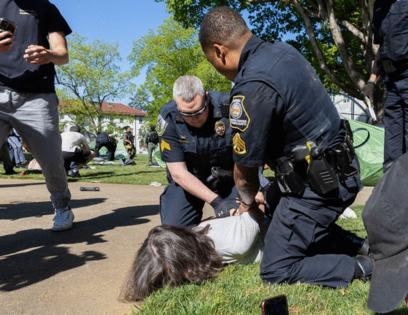Legal groups say repercussions for protesters are worse in Georgia
Published in News & Features
ATLANTA — Demonstrators in Georgia and the Southeast are taking more of a risk than those in other parts of the country, some legal and advocacy organizations say.
Representatives from groups including the National Lawyers Guild, Project South and the Council on American-Islamic Relations (CAIR) Georgia as well as some students involved in last week’s pro-Palestinian protests at Emory University held a briefing Monday to highlight how Georgia’s policing laws differ from other states.
Hillary Holley, who organized the online briefing, said police in Georgia are given too much authority.
“We have very militarized police and so what the students here in Georgia are going to be facing, and some have already faced, will look different (than protesters in other states),” she said.
Organizers of the briefing declined to take questions, citing efforts to ensure the safety of the students on the call.
Students at Columbia University in New York City earlier this month set up a pro-Palestinian encampment on campus, which sparked a wave of similar demonstrations around the country. That included Emory, where students tried to establish an encampment on the quad in the middle of campus last Thursday. Soon afterward, police and state troopers swarmed the area and arrested 16 members of the Emory community.
While hundreds of protesters have been arrested on other campuses — from the Northeast to California — the hosts of Monday’s briefing said Georgia law gives police more authority than they have in some other states.
Officers on Emory’s campus were armed with rubber bullets and used chemical irritants, which drew criticism from some lawmakers.
Although campus demonstrators have described themselves and their efforts as peaceful, some in the Jewish community have questioned that. Protesters at Emory on Thursday chanted, “From the river to the sea, Palestine will be free,” and “There is only one solution: Intifada revolution,” which many interpret as antisemitic phrases calling for the destruction of Israel.
“The protests ... have deeply affected the Jewish community of Atlanta, infringing on our sense of safety, both emotional and physical,” said Camellia Heart-Katz, who works in young leadership at American Jewish Committee Atlanta.
_____
©2024 The Atlanta Journal-Constitution. Visit at ajc.com. Distributed by Tribune Content Agency, LLC.







Comments